|
ASSYRIA AND BABYLONIA--THE GREAT
SEMITIC MELTING-POT
We often call America the "Melting-pot." When we use this term we
mean that many races from all over the earth have gathered along the
banks of the Atlantic and the Pacific Oceans to find a new home and
begin a new career amidst more favorable surroundings than were to
be found in the country of their birth. It is true, Mesopotamia was
much smaller than our own country. But the fertile valley was the
most extraordinary "melting-pot" the world has ever seen and it
continued to absorb new tribes for almost two thousand years. The
story of each new people, clamoring for homesteads along the banks
of the Tigris and the Euphrates is interesting in itself but we can
give you only a very short record of their adventures.
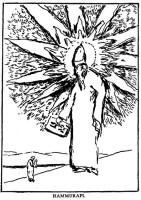
The Sumerians whom we met in the previous chapter, scratching
their history upon rocks and bits of clay (and who did not belong to
the Semitic race) had been the first nomads to wander into
Mesopotamia. Nomads are people who have no settled homes and no
grain fields and no vegetable gardens but who live in tents and keep
sheep and goats and cows and who move from pasture to pasture,
taking their flocks and their tents wherever the grass is green and
the water abundant.
Far and wide their mud huts had covered the plains. They were
good fighters and for a long time they were able to hold their own
against all invaders.
But four thousand years ago a tribe of Semitic desert people
called the Akkadians left Arabia, defeated the Sumerians and
conquered Mesopotamia. The most famous king of these Akkadians was
called Sargon.
He taught his people how to write their own Semitic language in
the alphabet of the Sumerians whose territory they had just
occupied. He ruled so wisely that soon the differences between the
original settlers and the invaders disappeared and they became fast
friends and lived together in peace and harmony.
The fame of his empire spread rapidly throughout western Asia and
others, hearing of this success, were tempted to try their own luck.
A new tribe of desert nomads, called the Amorites, broke up camp
and moved northward.
Thereupon the valley was the scene of a great turmoil until an
Amorite chieftain by the name of Hammurapi (or Hammurabi, as you
please) established himself in the town of Bab-Illi (which means the
Gate of the God) and made himself the ruler of a great Bab-Illian or
Babylonian Empire.
This Hammurapi, who lived twenty-one centuries before the birth
of Christ, was a very interesting man. He made Babylon the most
important town of the ancient world, where learned priests
administered the laws which their great Ruler had received from the
Sun God himself and where the merchant loved to trade because he was
treated fairly and honorably.
Indeed if it were not for the lack of space (these laws of
Hammurapi would cover fully forty of these pages if I were to give
them to you in detail) I would be able to show you that this ancient
Babylonian State was in many respects better managed and that the
people were happier and that law and order was maintained more
carefully and that there was greater freedom of speech and thought
than in many of our modern countries.
But our world was never meant to be too perfect and soon other
hordes of rough and murderous men descended from the northern
mountains and destroyed the work of Hammurapi's genius.
The name of these new invaders was the Hittites. Of these
Hittites I can tell you even less than of the Sumerians. The Bible
mentions them. Ruins of their civilization have been found far and
wide. They used a strange sort of hieroglyphics but no one has as
yet been able to decipher these and read their meaning. They were
not greatly gifted as administrators. They ruled only a few years
and then their domains fell to pieces.
Of all their glory there remains nothing but a mysterious name
and the reputation of having destroyed many things which other
people had built up with great pain and care.
Then came another invasion which was of a very different nature.
A fierce tribe of desert wanderers, who murdered and pillaged in
the name of their great God Assur, left Arabia and marched northward
until they reached the slopes of the mountains. Then they turned
eastward and along the banks of the Euphrates they built a city
which they called Ninua, a name which has come down to us in the
Greek form of Nineveh. At once these new-comers, who are generally
known as the Assyrians, began a slow but terrible warfare upon all
the other inhabitants of Mesopotamia.
In the twelfth century before Christ they made a first attempt to
destroy Babylon but after a first success on the part of their King,
Tiglath Pileser, they were defeated and forced to return to their
own country.
Five hundred years later they tried again. An adventurous general
by the name of Bulu made himself master of the Assyrian throne. He
assumed the name of old Tiglath Pileser, who was considered the
national hero of the Assyrians and announced his intention of
conquering the whole world.
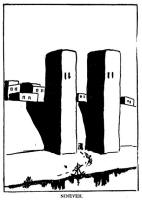
He was as good as his word.
Asia Minor and Armenia and Egypt and Northern Arabia and Western
Persia and Babylonia became Assyrian provinces. They were ruled by
Assyrian governors, who collected the taxes and forced all the young
men to serve as soldiers in the Assyrian armies and who made
themselves thoroughly hated and despised both for their greed and
their cruelty.
Fortunately the Assyrian Empire at its greatest height did not
last very long. It was like a ship with too many masts and sails and
too small a hull. There were too many soldiers and not enough
farmers--too many generals and not enough business men.
The King and the nobles grew very rich but the masses lived in
squalor and poverty. Never for a moment was the country at peace. It
was for ever fighting someone, somewhere, for causes which did not
interest the subjects at all. Until, through this continuous and
exhausting warfare, most of the Assyrian soldiers had been killed or
maimed and it became necessary to allow foreigners to enter the
army. These foreigners had little love for their brutal masters who
had destroyed their homes and had stolen their children and
therefore they fought badly.
Life along the Assyrian frontier was no longer safe.
Strange new tribes were constantly attacking the northern
boundaries. One of these was called the Cimmerians. The Cimmerians,
when we first hear of them, inhabited the vast plain beyond the
northern mountains. Homer describes their country in his account of
the voyage of Odysseus and he tells us that it was a place "for ever
steeped in darkness." They were a race of white men and they had
been driven out of their former homes by still another group of
Asiatic wanderers, the Scythians.The Scythians were the ancestors
of the modern Cossacks, and even in those remote days they were
famous for their horsemanship.
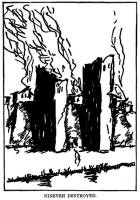
The Cimmerians, hard pressed by the Scythians, crossed from
Europe into Asia and conquered the land of the Hittites. Then they
left the mountains of Asia Minor and descended into the valley of
Mesopotamia, where they wrought terrible havoc among the
impoverished people of the Assyrian Empire.
Nineveh called for volunteers to stop this invasion. Her worn-out
regiments marched northward when news came of a more immediate and
formidable danger.
For many years a small tribe of Semitic nomads, called the
Chaldeans, had been living peacefully in the south-eastern part of
the fertile valley, in the country called Ur. Suddenly these
Chaldeans had gone upon the war-path and had begun a regular
campaign against the Assyrians.
Attacked from all sides, the Assyrian State, which had never
gained the good-will of a single neighbor, was doomed to perish.
When Nineveh fell and this forbidding treasure house, filled with
the plunder of centuries, was at last destroyed, there was joy in
every hut and hamlet from the Persian Gulf to the Nile.
And when the Greeks visited the Euphrates a few generations later
and asked what these vast ruins, covered with shrubs and trees might
be, there was no one to tell them.
The people had hastened to forget the very name of the city that
had been such a cruel master and had so miserably oppressed them.
Babylon, on the other hand, which had ruled its subjects in a
very different way, came back to life.
During the long reign of the wise King Nebuchadnezzar the ancient
temples were rebuilt. Vast palaces were erected within a short space
of time. New canals were dug all over the valley to help irrigate
the fields. Quarrelsome neighbors were severely punished.
Egypt was reduced to a mere frontier-province and Jerusalem, the
capital of the Jews, was destroyed. The Holy Books of Moses were
taken to Babylon and several thousand Jews were forced to follow the
Babylonian King to his capital as hostages for the good behavior of
those who remained behind in Palestine.
But Babylon was made into one of the seven wonders of the ancient
world.
Trees were planted along the banks of the Euphrates.
Flowers were made to grow upon the many walls of the city and
after a few years it seemed that a thousand gardens were hanging
from the roofs of the ancient town.
As soon as the Chaldeans had made their capital the show-place of
the world they devoted their attention to matters of the mind and of
the spirit.
Like all desert folk they were deeply interested in the stars
which at night had guided them safely through the trackless desert.
They studied the heavens and named the twelve signs of the Zodiak.
They made maps of the sky and they discovered the first five
planets. To these they gave the names of their Gods. When the Romans
conquered Mesopotamia they translated the Chaldean names into Latin
and that explains why today we talk of Jupiter and Venus and Mars
and Mercury and Saturn.
They divided the equator into three hundred and sixty degrees and
they divided the day into twenty-four hours and the hour into sixty
minutes and no modern man has ever been able to improve upon this
old Babylonian invention. They possessed no watches but they
measured time by the shadow of the sun-dial.
They learned to use both the decimal and the duodecimal systems
(nowadays we use only the decimal system, which is a great pity).
The duodecimal system (ask your father what the word means),
accounts for the sixty minutes and the sixty seconds and the
twenty-four hours which seem to have so little in common with our
modern world which would have divided day and night into twenty
hours and the hour into fifty minutes and the minute into fifty
seconds according to the rules of the restricted decimal system.
The Chaldeans also were the first people to recognize the
necessity of a regular day of rest.
When they divided the year into weeks they ordered that six days
of labor should be followed by one day, devoted to the "peace of the
soul."
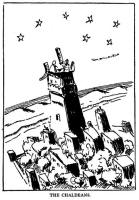
It was a great pity that the center of so much intelligence and
industry could not exist for ever. But not even the genius of a
number of very wise Kings could save the ancient people of
Mesopotamia from their ultimate fate.
The Semitic world was growing old.
It was time for a new race of men.
In the fifth century before Christ, an Indo-European people
called the Persians (I shall tell you about them later) left its
pastures amidst the high mountains of Iran and conquered the fertile
valley.
The city of Babylon was captured without a struggle.
Nabonidus, the last Babylonian king, who had been more interested
in religious problems than in defending his own country, fled.
A few days later his small son, who had remained behind, died.
Cyrus, the Persian King, buried the child with great honor and
then proclaimed himself the legitimate successor of the old rulers
of Babylonia.
Mesopotamia ceased to be an independent State.
It became a Persian province ruled by a Persian "Satrap" or
Governor.
As for Babylon, when the Kings no longer used the city as their
residence it soon lost all importance and became a mere country
village.
In the fourth century before Christ it enjoyed another spell of
glory.
It was in the year 331 B.C. that Alexander the Great, the young
Greek who had just conquered Persia and India and Egypt and every
other place, visited the ancient city of sacred memories. He wanted
to use the old city as a background for his own newly-acquired
glory. He began to rebuild the palace and ordered that the rubbish
be removed from the temples.
Unfortunately he died quite suddenly in the Banqueting Hall of
Nebuchadnezzar and after that nothing on earth could save Babylon
from her ruin.
As soon as one of Alexander's generals, Seleucus Nicator, had
perfected the plans for a new city at the mouth of the great canal
which united the Tigris and the Euphrates, the fate of Babylon was
sealed.
A tablet of the year 275 B.C. tells us how the last of the
Babylonians were forced to leave their home and move into this new
settlement which had been called Seleucia.
Even then, a few of the faithful continued to visit the holy
places which were now inhabited by wolves and jackals.
The majority of the people, little interested in those
half-forgotten divinities of a bygone age, made a more practical use
of their former home.
They used it as a stone-quarry.
For almost thirty centuries Babylon had been the great spiritual
and intellectual center of the Semitic world and a hundred
generations had regarded the city as the most perfect expression of
their people's genius.
It was the Paris and London and New York of the ancient world.
At present three large mounds show us where the ruins lie buried
beneath the sand of the ever-encroaching desert.
THIS IS THE STORY OF
MOSES
High above the thin line of the distant horizon there appeared a
small cloud of dust. The Babylonian peasant, working his poor farm
on the outskirts of the fertile lands, noticed it.
"Another tribe is trying to break into our land," he said to
himself. "They will not get far. The King's soldiers will drive them
away."
He was right. The frontier guards welcomed the new arrivals with
drawn swords and bade them try their luck elsewhere.
They moved westward following the borders of the land of Babylon
and they wandered until they reached the shores of the
Mediterranean.
There they settled down and tended their flocks and lived the
simple lives of their earliest ancestors who had dwelt in the land
of Ur.
Then there came a time when the rain ceased to fall and there was
not enough to eat for man or beast and it became necessary to look
for new pastures or perish on the spot.
Once more the shepherds (who were called the Hebrews) moved their
families into a new home which they found along the banks of the Red
Sea near the land of Egypt.
But hunger and want had followed them upon their voyage and they
were forced to go to the Egyptian officials and beg for food that
they might not starve.
The Egyptians had long expected a famine. They had built large
store-houses and these were all filled with the surplus wheat of the
last seven years. This wheat was now being distributed among the
people and a food-dictator had been appointed to deal it out equally
to the rich and to the poor. His name was Joseph and he belonged to
the tribe of the Hebrews.
As a mere boy he had run away from his own family. It was said
that he had escaped to save himself from the anger of his brethren
who envied him because he was the favorite of their Father.
Whatever the truth, Joseph had gone to Egypt and he had found
favor in the eyes of the Hyksos Kings who had just conquered the
country and who used this bright young man to assist them in
administering their new possessions.
As soon as the hungry Hebrews appeared before Joseph with their
request for help, Joseph recognized his relatives.
But he was a generous man and all meanness of spirit was foreign
to his soul.
He did not revenge himself upon those who had wronged him but he
gave them wheat and allowed them to settle in the land of Egypt,
they and their children and their flocks--and be happy.
For many years the Hebrews (who are more commonly known as the
Jews) lived in the eastern part of their adopted country and all was
well with them.
Then a great change took place.
A sudden revolution deprived the Hyksos Kings of their power and
forced them to leave the country. Once more the Egyptians were
masters within their own house. They had never liked foreigners any
too well. Three hundred years of oppression by a band of Arab
shepherds had greatly increased this feeling of loathing for
everything that was alien.
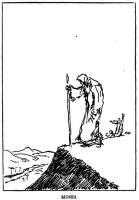
The Jews on the other hand had been on friendly terms with the
Hyksos who were related to them by blood and by race. This was
enough to make them traitors in the eyes of the Egyptians.
Joseph no longer lived to protect his people.
After a short struggle they were taken away from their old homes,
they were driven into the heart of the country and they were treated
like slaves.
For many years they performed the dreary tasks of common laborers,
carrying stones for the building of pyramids, making bricks for
public buildings, constructing roads, and digging canals to carry
the water of the Nile to the distant Egyptian farms.
Their suffering was great but they never lost courage and help
was near.
There lived a certain young man whose name was Moses. He was very
intelligent and he had received a good education because the
Egyptians had decided that he should enter the service of Pharaoh.
If nothing had happened to arouse his anger, Moses would have
ended his days peacefully as the governor of a small province or the
collector of taxes of an outlying district.
But the Egyptians, as I have told you before, despised those who
did not look like themselves nor dress in true Egyptian fashion and
they were apt to insult such people because they were "different."
And because the foreigners were in the minority they could not
well defend themselves. Nor did it serve any good purpose to carry
their complaints before a tribunal for the Judge did not smile upon
the grievances of a man who refused to worship the Egyptian gods and
who pleaded his case with a strong foreign accent.
Now it occurred one day that Moses was taking a walk with a few
of his Egyptian friends and one of these said something particularly
disagreeable about the Jews and even threatened to lay hands on
them.
Moses, who was a hot-headed youth hit him.
The blow was a bit too severe and the Egyptian fell down dead.
To kill a native was a terrible thing and the Egyptian laws were
not as wise as those of Hammurapi, the good Babylonian King, who
recognized the difference between a premeditated murder and the
killing of a man whose insults had brought his opponent to a point
of unreasoning rage.
Moses fled.
He escaped into the land of his ancestors, into the Midian
desert, along the eastern bank of the Red Sea, where his tribe had
tended their sheep several hundred years before.
A kind priest by the name of Jethro received him in his house and
gave him one of his seven daughters, Zipporah, as his wife.
There Moses lived for a long time and there he pondered upon many
deep subjects. He had left the luxury and the comfort of the palace
of Pharaoh to share the rough and simple life of a desert priest.
In the olden days, before the Jewish people had moved into Egypt,
they too had been wanderers among the endless plains of Arabia. They
had lived in tents and they had eaten plain food, but they had been
honest men and faithful women, contented with few possessions but
proud of the righteousness of their mind.
All this had been changed after they had become exposed to the
civilization of Egypt. They had taken to the ways of the
comfort-loving Egyptians. They had allowed another race to rule them
and they had not cared to fight for their independence.
Instead of the old gods of the wind-swept desert they had begun
to worship strange divinities who lived in the glimmering splendors
of the dark Egyptian temples.
Moses felt that it was his duty to go forth and save his people
from their fate and bring them back to the simple Truth of the olden
days.
And so he sent messengers to his relatives and suggested that
they leave the land of slavery and join him in the desert.
But the Egyptians heard of this and guarded the Jews more
carefully than ever before.
It seemed that the plans of Moses were doomed to failure when
suddenly an epidemic broke out among the people of the Nile Valley.
The Jews who had always obeyed certain very strict laws of health
(which they had learned in the hardy days of their desert life)
escaped the disease while the weaker Egyptians died by the hundreds
of thousands.
Amidst the confusion and the panic which followed this Silent
Death, the Jews packed their belongings and hastily fled from the
land which had promised them so much and which had given them so
little.
As soon as the flight became known the Egyptians tried to follow
them with their armies but their soldiers met with disaster and the
Jews escaped.
They were safe and they were free and they moved eastward into
the waste spaces which are situated at the foot of Mount Sinai, the
peak which has been called after Sin, the Babylonian God of the
Moon.
There Moses took command of his fellow-tribesmen and commenced
upon his great task of reform.
In those days, the Jews, like all other people, worshipped many
gods. During their stay in Egypt they had even learned to do homage
to those animals which the Egyptians held in such high honor that
they built holy shrines for their special benefit. Moses on the
other hand, during his long and lonely life amidst the sandy hills
of the peninsula, had learned to revere the strength and the power
of the great God of the Storm and the Thunder, who ruled the high
heavens and upon whose good-will the wanderer in the desert depended
for life and light and breath.
This God was called Jehovah and he was a mighty Being who was
held in trembling respect by all the Semitic people of western Asia.
Through the teaching of Moses he was to become the sole Master of
the Jewish race.
One day Moses disappeared from the camp of the Hebrews. He took
with him two tablets of rough-hewn stone. It was whispered that he
had gone to seek the solitude of Mount Sinai's highest peak.
That afternoon, the top of the mountain was lost to sight.
The darkness of a terrible storm hid it from the eye of man.
But when Moses returned, behold! ... there stood engraved upon
the tablets the words which Jehovah himself had spoken amidst the
crash of his thunder and the blinding flashes of his lightning.
From that moment on, no Jew dared to question the authority of
Moses.
When he told his people that Jehovah commanded them to continue
their wanderings, they obeyed with eagerness.
For many years they lived amidst the trackless hills of the
desert.
They suffered great hardships and almost perished from lack of
food and water.
But Moses kept high their hopes of a Promised Land which would
offer a lasting home to the true followers of Jehovah.
At last they reached a more fertile region.
They crossed the river Jordan and, carrying the Holy Tablets of
Law, they made ready to occupy the pastures which stretch from Dan
to Beersheba.
As for Moses, he was no longer their leader.
He had grown old and he was very tired.
He had been allowed to see the distant ridges of the Palestine
Mountains among which the Jews were to find a Fatherland.
Then he had closed his wise eyes for all time.
He had accomplished the task which he had set himself in his
youth.
He had led his people out of foreign slavery into the new freedom
of an independent life.
He had united them and he had made them the first of all nations
to worship a single God. |
